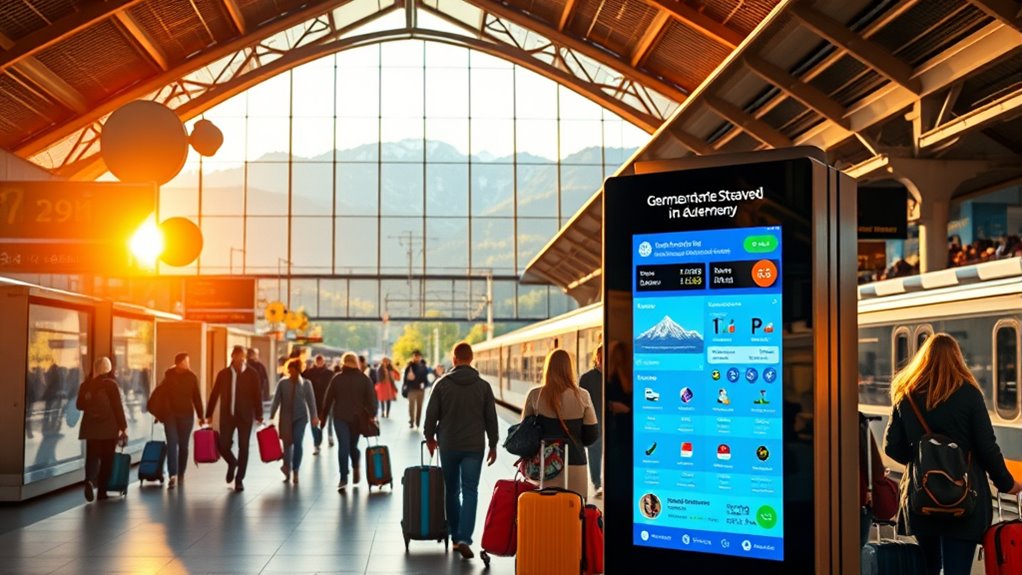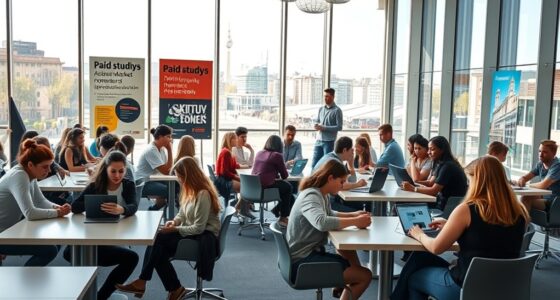To leverage tourism trends in Germany, take advantage of remote services like online booking platforms that offer eco-friendly accommodations with reliable Wi-Fi. Use virtual tours and customized local experiences to plan your trip efficiently. Cities now provide digital nomad packages, connecting you with coworking spaces and networking events. Embracing sustainable travel options and digital tools can make your visit more responsible and enriching. Discover more ways to enhance your experience as you explore these innovative solutions.
Key Takeaways
- Digital platforms offer tailored accommodation and experience bookings, catering to remote travelers seeking flexible, eco-friendly options in Germany.
- Cities like Berlin and Munich provide coworking spaces and reliable internet, supporting digital nomads blending work and leisure.
- Virtual tours and online consultations help travelers customize trips and discover local gems before arriving in Germany.
- Eco-conscious travel services promote responsible exploration, encouraging support for local businesses and sustainable activities.
- Innovative technologies like nanotechnology are enhancing sustainable tourism infrastructure, making eco-friendly travel more accessible and efficient.

Germany’s tourism industry is experiencing a dynamic shift as travelers increasingly seek authentic experiences and sustainable travel options. As a result, you’ll notice a growing emphasis on eco-friendly practices and responsible tourism, which appeal to those who want to explore without leaving a heavy environmental footprint. This shift encourages you to look for ways to enjoy Germany’s diverse landscapes while being mindful of sustainability. For instance, you might choose eco-lodges, support local businesses, or participate in conservation activities. This approach not only enhances your travel experience but also helps preserve the destinations you visit for future travelers.
Germany’s tourism shift emphasizes eco-friendly practices and responsible exploration to protect natural and cultural heritage.
Another significant trend shaping Germany’s tourism scene is digital nomadism. More travelers are working remotely and combining work with leisure, which creates a unique opportunity for you to enjoy the country’s vibrant cities and scenic regions without sacrificing your professional commitments. Germany offers excellent infrastructure, high-speed internet, and coworking spaces that cater to digital nomads. Cities like Berlin, Munich, and Hamburg are becoming hubs for remote workers, providing a thriving environment where you can balance work and exploration seamlessly. Whether you prefer working from cozy cafés, dedicated coworking centers, or scenic outdoor locations, Germany’s versatile environment supports your lifestyle.
Leveraging remote services is vital to making the most of this trend. You can access online platforms for booking accommodations that cater specifically to digital nomads, such as apartments with reliable Wi-Fi and flexible leases. Many cities also provide digital nomad-specific packages, including guided tours, local experiences, and networking events that help you connect with like-minded travelers. These services streamline your planning process, allowing you to focus on enjoying your trip without logistical worries. Additionally, many tourism providers now offer virtual tours or online consultations, making it easier to customize your travel experience and discover hidden gems before you even arrive.
Sustainable travel and digital nomadism intersect naturally in Germany, as both emphasize responsible exploration and leveraging technology to enhance your journey. With the right remote services, you can reduce your environmental impact, support local economies, and create more meaningful experiences. You’ll find that Germany’s commitment to sustainability is woven into many aspects of its tourism offerings, from eco-friendly transportation options to community-based tourism projects. By choosing these services and embracing these trends, you’re not just a visitor—you become a conscious traveler who actively contributes to the preservation of the country’s rich cultural and natural heritage. This approach guarantees that your adventure in Germany remains authentic, enriching, and environmentally responsible. Additionally, advancements in nanotechnology are beginning to influence sustainable tourism infrastructure, offering innovative solutions for eco-efficient travel options.
Frequently Asked Questions
How Do Remote Services Enhance Travel Safety in Germany?
Remote services boost your travel safety in Germany by providing instant access to virtual guides and emergency apps. Virtual guides help you navigate unfamiliar areas confidently, while emergency apps alert you to local hazards or urgent situations. With these tools, you stay informed and connected, ensuring quick responses during emergencies. This proactive approach minimizes risks, making your trip safer and more enjoyable, no matter where you explore in Germany.
What Are the Costs Associated With Remote Tourism Services?
The costs for remote tourism services vary depending on the provider and features offered. You should compare service fees across different platforms to find the best value, considering factors like real-time translation, virtual guides, or safety alerts. While some basic services may be free or low-cost, premium options often come with higher fees. Conduct a thorough cost comparison to confirm you get the services you need without overspending.
How Accessible Are Remote Services for Differently-Abled Travelers?
Imagine a bridge that connects you to your adventures—remote services aim to be that bridge. While accessibility barriers still exist, many providers now incorporate assistive technologies to help differently-abled travelers navigate seamlessly. These innovations make remote tourism more inclusive, but gaps remain. With continued effort and investment, the bridge will become stronger, ensuring everyone can cross into the wonders of Germany’s virtual and real experiences.
Can Remote Services Replace In-Person Travel Experiences Entirely?
Remote services can’t fully replace in-person travel experiences because virtual interactions lack the sensory and emotional depth of being immersed in a new culture. While you can enjoy virtual interactions and explore cultural sites online, they don’t provide the same connection or authenticity. For a complete experience, combining remote services with actual travel allows you to enjoy the best of both worlds—convenience and genuine cultural immersion.
What Technological Requirements Are Necessary to Access Remote Tourism Services?
Think of accessing remote tourism services as opening a digital gateway—you’ll need robust digital infrastructure like high-speed internet and reliable devices. Your journey also depends on strong cybersecurity measures to keep your virtual experience safe, like a shield protecting your data. Guarantee your system is updated and secure, so you can explore Germany’s wonders from your screen without a hitch, turning your home into a virtual travel hub.
Conclusion
By embracing remote services, you can access Germany’s breathtaking landscapes and rich culture from anywhere in the world. As you tap into these innovative trends, you’ll find yourself experiencing the country’s wonders like never before—without leaving your comfort zone. This shift isn’t just a trend; it’s a revolution that makes exploring Germany easier, more accessible, and more exciting than ever. Get ready, because these services will transform your travel dreams into reality faster than you can say “Oktoberfest!”








